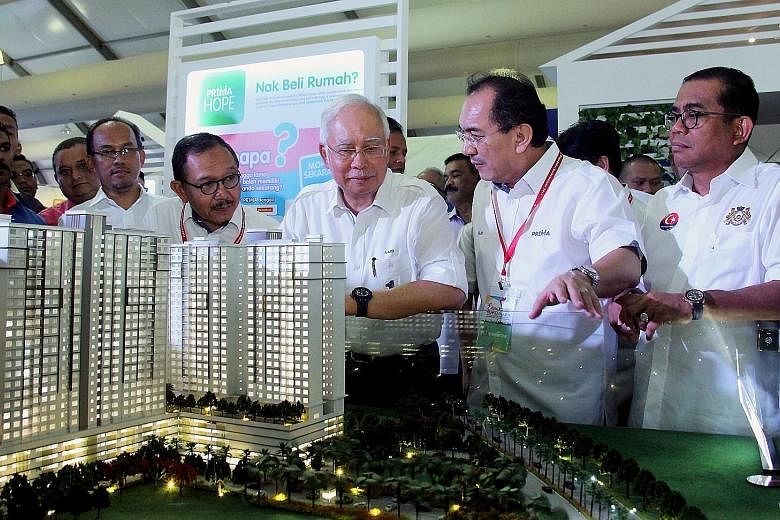Lawyer Puspawati Rosman and her husband have doubled their income in the last three years, yet they are nowhere closer to finding their dream home in the Klang Valley, unless they raise their budget from RM500,000 (S$163,000) to RM700,000. But that would require them to have ready cash of at least RM120,000, to cover the down payment and related expenses like stamp duty and furnishing costs, a sum they can ill-afford despite being in the top 20 per cent of earners in Malaysia.
"Sure, we can buy a studio apartment. But when I have a child, is she going to sleep on the balcony?" asks the 36-year-old, who is renting in Kuala Lumpur, where the average house price is RM800,000.
The dilemma worsens for those in the lower wage brackets, despite government efforts.
Housing affordability was a key plank in the ruling Barisan Nasional's 2013 election manifesto. Then, housing was one of the top two issues that Malaysians highlighted in Prime Minister Najib Razak's pre-Budget feedback session. Ahead of this Friday's Budget 2018 announcement - the last before an election that must be held by next August - it still ranks in the top three of voter concerns.
Malaysia's central bank was the bearer of bad news in July, when it said home ownership is still seriously unaffordable, with median prices at 4.4 times annual median income, the same as back in 2014. It is a level considered "seriously unaffordable" by American housing consultancy Demographia, which found the United States (3.9) and Japan (4.1) to be more affordable while Singapore was at 4.8 in 2015.
Quizzed this month over the failure to address the issue, Second Finance Minister Johari Abdul Ghani admitted that despite increases in household income, "in the last five years, the increase in median house prices is greater... it's a big gap".
Median house price data is not readily available, but average prices have risen by 40 per cent from 2012 to 2016, just slightly outpacing household income growth of 39 per cent.
Homes priced under RM250,000 accounted for less than 30 per cent of new launches in 2015-2016 , compared with 70 per cent in 2008-2009. According to Bank Negara Malaysia simulations in March, people earning RM3,000 monthly could only finance a home worth RM176,000, while those earning RM5,000 could pay RM283,000 for a house. But only 53 per cent of households earn RM5,000 or more.
Datuk Seri Johari said the supply-demand gap has worsened this year, with only 20 per cent of new units in the first quarter priced under RM250,000, despite demand for this segment making up 42 per cent of the market.
The government has introduced various schemes to help poorer Malaysians purchase their first home, in addition to already providing public housing.
But several of these new schemes have been geared towards increasing financing, or subsidising up to RM30,000 of the purchase, which some argue only serve to support the higher prices set by developers.
"(Developers) want banks and Bank Negara to ease lending practices to make it easy for house owners to own properties. The principle seems to be not to build houses that consumers can afford, but to build overpriced houses, and then put pressure on the lending institutions to give loans to the consumers," said Federation of Malaysian Consumer Associations secretary-general Paul Selva Raj.
Chemist Faisal Fadzil and his wife are among those who ended up spending more than they planned to after three years of fruitless shopping around Shah Alam, the capital of Selangor. They bit the bullet and bought a house in Puncak Alam, a township nearly twice the distance to his Kuala Lumpur workplace.
"There were cheaper houses in Shah Alam, but they were subsale. So even though we will pay RM711,000 for the unit we bought, the developer offered rebates and discounts so we only needed RM16,000 upfront," the 29-year-old said.
Such arrangements saddle buyers with larger loans than they would have liked. Tellingly, the Employees Provident Fund has seen applications to withdraw a portion of pension savings for first home purchases drop from 7.4 to 4.9 per cent of all withdrawals between 2010 and 2015. But applications for withdrawals to reduce mortgages increased from 5.1 to 7.9 per cent in the same period.
"This mirrors the slowdown in the housing market generally, while intimating that households are looking at their cash flow," said the national pension fund.
Still, there is one government programme that has been well-received. PR1MA has received RM4 billion in government grants to build half a million affordable homes in urban and suburban areas, priced at about 20 per cent below the prevailing market rate, or between RM100,000 and RM400,000 per unit. The response has been overwhelming, with 1.5 million Malaysians registering to buy.
But since being established in 2012, it has completed only 17,000 homes, and has had to raise its qualifying household income level from RM7,500 per month to double that, to reflect the rising cost of living and its impact on housing affordability.
A monthly qualifying income of RM15,000, however, means schemes like PR1MA extend government aid to Malaysia's richest 20 per cent, says state-linked think-tank Khazanah Research Institute. Put another way, it means 91 per cent of Penang residents are eligible for affordable housing, says research director Suraya Ismail. "Housing policy needs to be reviewed," she concludes.
Shannon Teoh



